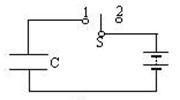问题
选择题
电路中C是平行板电容器,S先触1后又扳到2,若这时将平行板的板间距拉大一点,下列说法正确的是 ( )

A.平行板电容器两板的电势差不变
B.平行扳电容器带电量不变
C.平行板电容器两板的电势差增大
D.平行板电容器两板间的的电场强度不变
答案
BCD
题目分析:本题S先触1后又扳到2,电容器所带电荷量不变
AC、由 可知,板间距离增大,C减小,Q不变则U增大;A错误,C正确
可知,板间距离增大,C减小,Q不变则U增大;A错误,C正确
B、扳到2后,电容与电路断开,极板上的电荷就不会移到别处;正确
D、 ,式中各量均不变,则电场强度不变,与板间距离无关;正确
,式中各量均不变,则电场强度不变,与板间距离无关;正确
故选BCD
点评:中等难度。影响电容的因素有很多,实验中采用控制变量法,即使一个物理量发生改变时,控制其他变量不变,这样容易发现规律.(这种方法在物理研究中经常用到)
